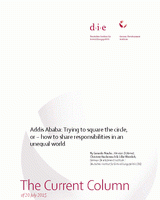Addis Ababa: Trying to square the circle, or – how to share responsibilities in an unequal world
Bracho, Gerardo / Christine Hackenesch / Silke WeinlichThe Current Column (2015)
Bonn: German Development Institute / Deutsches Institut für Entwicklungspolitik (DIE) (The Current Column of 20 July 2015)
Bonn, Mexico City, 20 July 2015. The UN Conference on Financing for Development in Addis Ababa ended with a last-minute agreement. The Addis Conference was expected to lay the groundwork for the upcoming major events later in the year on the new set of Sustainable Development Goals (SDGs) and on a universal climate agreement.
One of the most contested issues it faced was the question: How should responsibilities, including financial ones, be shared among industrialized and developing countries and particularly the subset of the latter formed by Southern providers engaged in South-South cooperation (China, Brazil, India Turkey, Mexico, and others)? For an agenda as ambitious, broad and visionary as the post-2015 agenda, strong commitments by all countries were hoped for. Yet in the end, both rich and high middle income countries shied away from responsibilities instead of seizing them.
Bringing universality to the sustainable development agenda – but sticking to old divisions and roles
In 2012, UN member states agreed that the new sustainable development agenda should follow the principle of universality. ‘Universality’ implies that both developing and developed countries need to implement change; an approach that questions the traditional dichotomy between North and South. In the run-up to the Addis conference there was general agreement that the negotiations should also include the financing of the new sustainable development agenda. Thus, the EU insisted that a universal agenda supposes that all actors contribute according to their means. It particularly encouraged Southern providers to assume more responsibilities and take on clear, measurable commitments.
Developing countries, however, interpreted the rhetoric of ‘burden sharing’ as a ploy of traditional donors to withdraw from their previous commitments. This interpretation was reinforced by the insistence of many donors on the “diminished role” of development aid, and their focus on other resources such as taxes, remittances or contributions from the private sector. Recent aid cuts in several EU member states further undermined the credibility of the EU’s commitment to collectively reaching the 0.7 target by 2030.
To avoid engaging in what they perceived as a “shameful burden sharing” exercise, the main Southern providers portrayed themselves as typical developing countries operating under the G77 umbrella and within the traditional North-South dichotomy. This allowed them to pressure developed countries to fulfil their aid commitments while avoiding commitments themselves. Southern providers are of course right in insisting that the rich should keep to their responsibilities and commitments. Nevertheless, they unwittingly weakened their case by failing to assume their new status as emerging powers and by evading any concrete commitment to help their poorer neighbours in the South.
The way to a compromise
To arrive at a compromise between the extremes represented by the G77 and the industrialised countries, it is essential to recognize that the South, as a concept that encompasses all developing countries, is still relevant: all developing countries face poverty and other development challenges. But it is also important to acknowledge that in contrast to previous decades, the South now includes a group of emerging economies with the economic capacity to take on differentiated responsibilities vis-à-vis poorer countries. That is, commitments according to their capacity that is clearly different from the North.
True, apparently accepting this idea, the G77 proposed to bring the concept of Common But Differentiated Responsibilities (CBDR) in various parts of the Addis outcome text. The problem with CBDR is that it is now equated with no responsibilities for developing countries; including, of course, emerging powers. This political stance has been helped by the double meaning of the word ‘responsibility’ which can mean both ‘accountability for an action in the past’ and ‘obligation to act in the future’; a double meaning that can lead to a logic by which those who consider themselves not responsible in the past assume no responsibilities in the future. This is how CBDR has been interpreted in UN climate negotiations, where the term was first coined. This is why industrialised countries blocked the inclusion of CBDR in Addis related to development cooperation.
An insistence on a radical North-South divide will negatively impact the global community and progress in achieving the SDGs. The longer Southern providers resist taking on global responsibilities and the more developed countries diminish their commitments while pressuring emerging economies to increase theirs, the less likely the realization of SDGs becomes. The fact that important G7 members are shying away from the 0.7 % target more openly than ever before does not help.
In the face of pressing global development challenges, which affect all countries, there should be a common, long-term interest for all countries to cooperate. If CBDR is now politically tainted, developed and developing countries could try to agree on another phrase; say “differential commitments (or responsibilities?)”, a term accepted by all parties at the Busan Summit of the Aid Effectiveness Agenda in 2011.
Gerardo Bracho is a Mexican diplomat. Mr Bracho’s views are his own; they should not be attributed to the Mexican Government.


